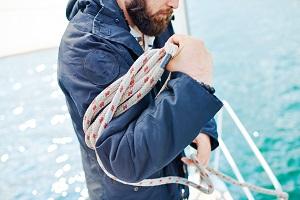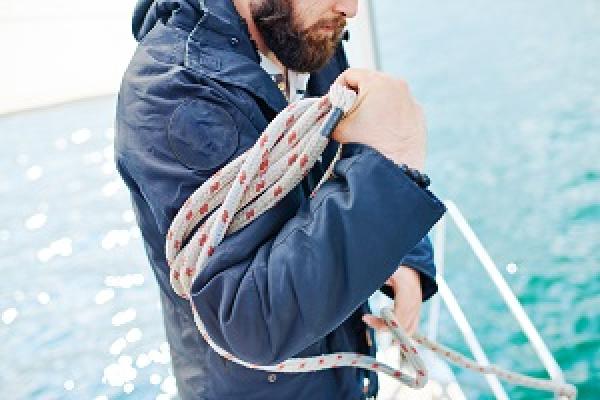
Steamship Mutual
Published: March 18, 2019

Until 2011, French domiciled seafarers did not have the right (as did other land-based employees) to claim enhanced compensation from the State when a work-related injury (or worse) was caused by the negligence (faute inexcusable) of the employer, a right that had existed elsewhere for decades. With MLC 2006 however, the French State looked again at the seafarer’s lot in order to ensure compliance with the intentions of the MLC. One of the results of this was the introduction of the laws of 9 March and 30 December 2017, and the consequent modification to Article L.5551-1 of the Transport Code.
The 9 March 2017 law stated that seafarers residing in France (and working on foreign flagged vessels) were obliged to be affiliated to the French social welfare regime (ENIM). However, a second law quickly followed relaxing the position, so that the law of 30 December of the same year clarified that affiliation was not obligatory, provided the ship owner proposed social welfare benefits (public or private) of at least an equivalent level to those provided by French social security (Article L.111-1 of the Social Security Code).
Article L.5551.1 criteria:
- Residence is stable and regular – a stay of at least 6 months within French territory.
Residence can be proven by such things as a tenancy agreement or utility contracts (telephone, electricity, gas etc.). For those without a residence but nonetheless working (and living) on board vessels, then the 6 months is satisfied by a presence in French territorial or internal waters – such presence being calculated over a 12 month rolling period (in other words the 6 month period does not have to be continual). - The seafarer must be working on a foreign-flagged (non EU /EEA) vessel.
- Will not relate to those vessels listed in Article L.5561-1 of the Transport Code, namely;
i) Coastal vessels undertaking a regular national coastal or cruise service around France of less than 650 gross tonnage;
ii) Coastal vessels undertaking a regular national coastal service around French islands, except those cargo carrying vessels of gross tonnage of greater than 650 tonnes when the voyage concerned follows or precedes a voyage to a destination to or from another State ; and
iii) Supply and service vessels used in French territorial or internal waters, for example, tugs, pilot vessels, specialist salvage vessels (including pollution control and wreck removal), also support vessels used to supply services to offshore windfarms.
iv) Vessels of “traditional construction” used to participate in nautical events are also excluded.
How will this work in practice?
- Social welfare protection for a seafarer qualifying as above must cover, (as per article L.111-1 of the Social Security Code), medical costs (interventions/hospital stays/long term illness care), maternity and paternity costs and healthcare costs (GP visits/prescribed medical products) for the seafarer and his beneficiaries. It must also cover sick pay in the event of illness or accident (work-related or not); compensation for permanent disability; retirement benefits including retirement pensions and family benefits (child maintenance and child care). The French social security system ENIM) offers this protection. Any alternative welfare package must offer the same cover;
- The ship owner must complete and send to ENIM a “declaration of honour” indicating that as employer, it undertakes to cover the seafarer.
- Where the ship owner elects not to affiliate itself to ENIM then the declaration and affiliation can be done by the employee, i.e. the seafarer.
- Where the seafarer is already affiliated to ENIM it can apply to opt out of the French social security welfare scheme as long as he/she will be covered by a welfare scheme providing at least equal protection. Where this is not the case then affiliation to ENIM will be maintained.
Penalties
- The French Social Security Code prescribes that where an employer (Ship owner) incites an employee (seafarer) to refuse to respect the provisions of the social security/transport codes, the employer can be punished by a prison sentence of maximum 2 years and/or a fine of €30,000.
- A person deliberately refusing to comply with affiliation obligations, or constantly delays/fails to comply with requests to undertake the administrative steps can be punished by a maximum prison sentence of 6 months and/or a fine of €15,000.
- The French criminal code also makes provision for a prison sentence/fine of €30,000 in the case of false declarations/incomplete declarations seeking to obtain payments or benefits under the French welfare system.
Conclusions
The ship owner employing seafarers where Article L.5551-1 applies currently has a stark choice; affiliate themselves and their employees to the French social security system (ENIM) or offer equivalent cover elsewhere (either public or private).
Contributing to ENIM is expensive. Social Security contributions for an employer can add significantly to salary costs in France (between 20%-30% of the gross wage is a rough marker).
Alternative systems may be more cost efficient but unfortunately the benefits under the French system are so wide and the calculations so complicated (permutations are endless given the amount of the benefit will often depend on the salary, age, dependants, etc. of the seafarer), that it is almost impossible to state with any certainty whether alternative welfare cover would be as generous as French social welfare benefits in any given situation. The authors asked ENIM to indicate its maximum limits for the calculation benefits, but they have been unable to provide this information.
There is a risk therefore that if Article L.5551-1 remains in force in its current form that ship owning employees offering welfare cover outside the ENIM system could find themselves involved in expensive legal disputes with current or ex-employees seeking to demonstrate that their welfare cover is inadequate compared to that offered by the French State.
There are a number of points however to take into account to try to put this new law into some sort of context;
- If this law proves to be more prejudicial than beneficial to the French maritime industry, because either ship owners or seafarers elect to base themselves elsewhere (Italy and Spain for example) then modifications to the law may follow.
- Article L.5551-1 was introduced to ensure France adhered to MLC 2006. Long before its application however, French tribunals and courts frequently intervened in the employment contracts of foreign ship owners and seafarer employees who were either French nationals/non-French but French residing. The French courts have shown a dislike of foreign (frequently tax haven) manning agency contracts incorporating foreign law into an employment contract. Where the seafarer has been able to show residency in France or employment based out of say a French port, then French courts have simply stepped in and overridden the applicable law and applied French law instead. The result is more or less the same as the intention of Article L.5551-1. In other words an employer could find itself bound to contribute to the French social security system or compensate an employee/ex-employer on the basis of the benefits and compensation available in France, even where it had made provision for the employment contract to apply non-French law.
- The danger of “travail dissimulé” has always existed too, and with potentially serious consequences for the employer. In simple terms, travail dissimulé means undeclared work, i.e. paying your crew either cash or gross, without declaring them to any welfare system or leaving them to their own means (knowing there is a likelihood that they will not make any private provision for such cover). This is a criminal offence in France and also provides for heavy fines and imprisonment.
- In other words the provisions of Article L.5551-1 are not new. The risks for any ship owner having vessels working out of French ports or working in French waters and employing seafarers on those vessels have always existed.
- In a sense the introduction of Article L.5551-1 has simplified the position or at least made it more transparent and available to non EU/EEA flagged vessels. ENIM has even provided declarations and forms in English to encourage affiliation.
Despite this context however, ship owning employers who fall within Article 5551-1 should be under no illusion. The only risk-free option, certainly given the relatively cheap access to justice for employees, combined with the pro-employee position of the French tribunals, is affiliation to the French social welfare regime, ENIM.

Article by Dani Allan, Christophe Hunkeler and Servane Bourree of Thomas Cooper LLP, Paris
Contact: [email protected]
[email protected]


